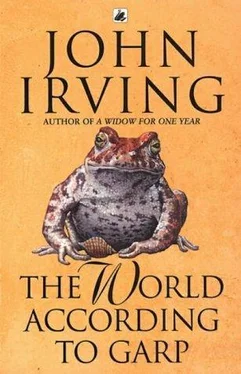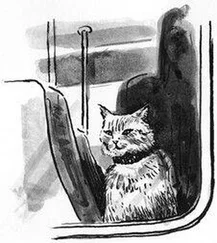“You're up early,” she told him, handing him the gearshift knob so that she could unlock her office door.
“Have you hurt yourself?” he asked. “You're bleeding.” Helen would think later that it was as if he had a nose for blood, because the slight scratch on her wrist had almost stopped bleeding.
“Are you going to be a doctor?” she asked him, letting him inside her office.
“I was going to be,” he said.
“What stopped you?” she asked, still not looking at him, but moving about her desk, straightening what was straight already; and adjusting the venetian blind, which had been left exactly as she wanted it. She took her glasses off, so that when she looked at him he was soft and fuzzy.
“Organic chemistry stopped me,” he said. “I dropped the course. And besides, I wanted to live in France.”
“Oh, you've lived in France?” Helen asked him, knowing that's what she was supposed to ask him, knowing it was one of the things he thought was special about himself, and he didn't hesitate to slip it in. He had even slipped it in the questionnaire. He was very shallow, she saw right away; she hoped he was the slightest bit intelligent, but she felt curiously relieved by his shallowness—as if this made him less dangerous to her, and left her a little freer.
They talked about France, which was fun for Helen, because she talked about France as well as Michael Milton talked about it, and she had never been to Europe. She also told him that she thought he had a poor reason for taking her course.
“A poor reason?” he pressed her, smiling.
“First of all,” Helen said, “it's a totally unrealistic expectation to have for the course.”
“Oh, you already have a lover?” Michael Milton asked her, still smiling.
Somehow he was so frivolous that he didn't insult her; she didn't snap at him that it was enough to have a husband, that it was none of his business, or that she was out of his league. She said, instead, that for what he wanted he should at least have registered for independent study. He said he'd be glad to switch courses. She said she never took on any new independent study students in the second semester.
She knew she had not entirely discouraged him, but she had not been exactly encouraging, either. Michael Milton talked to her, seriously, for an hour—about the subject of her course in narration. He discussed Virginia Woolf's The Waves and Jacob's Room very impressively, though he was not so good on To the Lighthouse and Helen knew he only pretended to have read Mrs. Dalloway . When he left, she was forced to agree with her two colleagues who'd evaluated Michael Milton previously: he was glib, he was smug, he was facile, and all that was unlikable; but he had a certain brittle smartness, however shiny and thin it was—and it was also , somehow, unlikable. What her colleagues had overlooked was his audacious smile and his way of wearing clothes as if he were defiantly undressed. But Helen's colleagues were men; they could not have been expected to define the precise audacity of Michael Milton's smile the way Helen could define it. Helen recognized it as a smile that said to her: I already know you, and I know everything you like. It was an infuriating smile, but it tempted her; she wanted to wipe it off his face. One way of wiping it off, Helen knew, would be to show Michael Milton that he didn't know her—or what she really liked—at all.
She also knew that not too many ways of showing him were open to her.
When she first shifted the Volvo, driving home, the point of the uncovered stick-shift shaft dug sharply into the heel of her hand. She knew exactly where Michael Milton had left the gear knob—on the window ledge above the wastebasket, where the janitor would find it and probably throw it away. It looked as if it ought to be thrown away, but Helen remembered that she had not phoned in the little numbers to the car garage. That would mean that she, or Garp, would have to call the car garage and try to order a new knob without the goddamn numbers—giving the year and model of the car, and so forth, and inevitably ending up with a knob that wasn't right.
But Helen decided she was not going back to her office, and she had enough on her mind already without trying to remember to call the janitor and tell him not to throw away the knob. Besides, it might already be too late.
And anyway, Helen thought, it's not just my fault. It's Garp's fault, too. Or, she thought, it's really nobody's fault. It's just one of those things.
But she did not quite feel guiltless; not yet. When Michael Milton gave her his papers to read—his old papers, from his other courses—she accepted them and read them, because at least this was an allowable, still-innocent subject for them to discuss: his work. When he grew bolder, and more attached to her, and he showed her even his creative work, his short stories and pathetic poems about France, Helen still felt that their long conversations were guided by the critical, constructive relationship between a student and a teacher.
It was all right to have lunch together; they had his work to talk about. Perhaps both of them knew that the work was not so special. For Michael Milton, any topic of conversation that justified his being with Helen was all right. For Helen, she was still anxious about the obvious conclusion—when he simply ran out of work; when they had consumed all the papers he'd had time to write; when they'd mentioned every book they had in common. Then Helen knew they would need a new subject. She also knew that this was only her problem—that Michael Milton already knew what the inevitable subject between them was. She knew he was smugly and irritatingly waiting for her to make up her mind; she occasionally wondered if he would be bold enough to raise his original answer to her questionnaire again, but she didn't think so. Perhaps both of them knew that he wouldn't have to—that the next move was hers. He would show her how grown-up he was by being patient. Helen wanted, above all, to surprise him.
But among these feelings that were new to her, there was one she disliked; she was most unused to feeling guilty—for Helen Holm always felt right about everything she did, and she needed to feel guiltless about this, too. She felt close to achieving this guilt-free state of mind, but she did not quite have it; not yet.
It would be Garp who provided her with the necessary feeling. Perhaps he sensed he had competition; Garp got started as a writer out of a sense of competition, and he finally broke out of his writing slump with a similar, competitive surge.
Helen, he knew, was reading someone else. It did not occur to Garp that she might be contemplating more than literature, but he saw with a typical writer's jealousy that someone else's words were keeping her up at night. Garp had first courted Helen with “The Pension Griliparzer.” Some instinct told him to court her again.
If that had been an acceptable motive to get a young writer started , it was a dubious motive for his writing now—especially after he'd been stopped for so long. He might have been in a necessary phase, rethinking everything, letting the well refill, preparing a book for the future with a proper period of silence. Somehow the new story he wrote for Helen reflected the forced and unnatural circumstances of its conception. The story was written less out of any real reaction to the viscera of life than it was written to relieve the anxieties of the writer.
It was possibly a necessary exercise for a writer who had not written in too long, but Helen did not care for the urgency with which Garp shoved the story at her. “I finally finished something,” he said. It was after dinner; the children were asleep; Helen wanted to go to bed with him—she wanted long and reassuring lovemaking, because she had come to the end of what Michael Milton had written; there was nothing more for her to read, or for them to talk about. She knew she should not show the slightest disappointment in the manuscript Garp gave her, but her tiredness overwhelmed her and she stared at it, crouching between dirty dishes.
Читать дальше












